Search Results

Interview of Thomas (Tim) Owens, October 14, 2022
Interviewed by Nancy Parrish
In this oral history interview, Tim Owens described his career path from military officer to private attorney to city council member to the state legislature. He served seven years in the Kansas House and then ran for the Kansas Senate where he chaired the Senate Judiciary Committee. Owens recounts the pressure from Governor Brownback to change the merit selection procedure for judges, making them elected. Also, the education bills were then being sent to the Judiciary Committee because of lawsuits and that caused friction because of the court's decisions on resolving the Montoy and Gannon school finance Show Morecases. Owens also dealt with a death penalty bill which failed 20-20. He described frequent trips "across the street" carrying messages between the Chief Justice and the Governor's office. He lost his bid for reelection to the Senate in 2012 and afterward taught at Johnson County Community College and retired from the military as a full colonel. He also served a year as municipal judge in Lenexa. Show Less
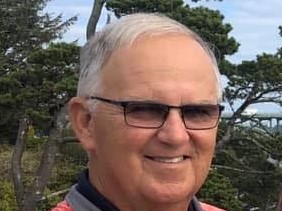
Interview Series of Don Hill by Janice Huston, Spring, 2017
Interviewed by Janice Huston
In a wide-ranging series of interviews conducted by Jan Huston of the Lyon County Historical Society, former Representative Don Hill talks candidly about his experiences over 14 years of service to the 60th district in the Kansas Legislature (2003-2016). During those 14 sessions Hill experienced a sea-change in legislative culture as well as a profound shift in political philosophy among its leaders. Hill worked closely with three governors - Sebelius, Parkinson, Brownback-- and several Speakers of the House. His interviews reveal the intricacies of creating public policy and making change happen. For Show Morestudents of Kansas government, this set of interviews is invaluable to understanding the shifts in leadership which occurred during this period, as well as policy failures and successes with tough issues such as Medicaid expansion, a 10-year highway plan, and expansion of a coal-fired plant in the Garden City area. Show Less
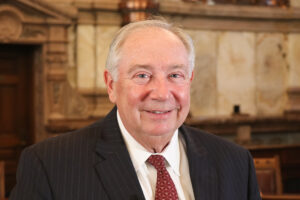
Interview of Jim Denning, April 13, 2023
Interviewed by Alan Conroy
Jim Denning served four years as Majority Leader for the Kansas Senate. His interview reveals his Western Kansas leanings, despite having worked, lived and represented Johnson County. HIs legislative interests included health care policy, funding KPERS and school finance. He described Senate Bill 9--KU Cancer designation--as one of his important contributions. Denning found that Governor Brownback’s tax plan was creating problems for Kansas – “too deep and unsustainable.” His philosophy was, "At the end of the day, you have to govern." Throughout his tenure in the Senate, Medicaid expansion was a pressing issue, but Show Morehe didn’t like the way the bills were constructed, so he developed a Republican alternative that he thought would be a model for the country. His interview details how he kept the Democratic alternative from passing, but his own bill was caught up in abortion politics and failed to pass. Denning led the Senate during 3 special sessions: school finance, COVID and repealing the Brownback tax plan. Historians will love this interview because of his candor and his position at a pivotal time in the legislature's history. Show Less
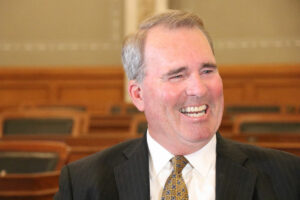
Interview of Robin Jennison, October 4, 2019
Interviewed by Jim McLean
Jim McLean’s interview of Robin Jennison is lengthy but full of interesting stories and anecdotes about what went on in the legislature in the last decade of the 20th Century. McLean teases out both the politics and policy from Jennison’s experiences in the House with the 1992 school finance bill and his Republican alternative. Jennison shares his philosophy on how to fund schools, lower property taxes, leadership races and his rapid rise to Speaker in the 1999-2000 sessions. The strategy he used to pass the 1999 transportation bill out of the House is clever. There is Show Morean anecdote about replacing carpet in the Judicial Center and what it took to get that appropriation passed. Jennison describes his role as Secretary of Wildlife and Parks and working under Governor Brownback. Show Less
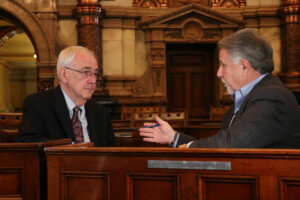
Interview of Tim Emert, October 4, 2019
Interviewed by Jim McLean
Tim Emert's interview covers his Senate career in the last decade of the Twentieth century, following passage of a markedly different school finance bill in 1992 and with a divided Republican caucus in the Senate--a time of big change. Emert stepped into the chairmanship of the Senate Judiciary committee immediately and later moved up to Majority Leader by a one-vote margin. The interview is filled with descriptions of coalitions he formed to get legislation passed. As Judiciary chair Emert dealt with both the death penalty, which he personally opposed, and a bill restricting late term abortions which Show Moreno one liked but passed. He worked with Christine Downey to get a major policy change regarding community colleges. There are also descriptions of his work on the State Board of Education and later, the Board of Regents. Emert describes himself as neither moderate or conservative, but "a realistic Republican." As Majority Leader he talks about the "juggling act" trying to keep communication with the conservative House Speakers (Shallenburger and Jennison) and the Senate. He explains the tension in having both the poorest and richest counties in his district and trying to provide equalization of school funding. The interview touches on the renovation of the Capitol and also renovation of Cedar Crest. Show Less
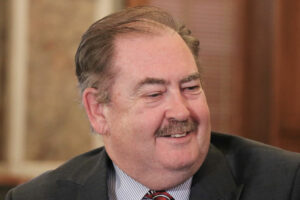
Interview of Tim Shallenburger, September 25, 2020
Interviewed by Alan Conroy
This interview with Tim Shallenburger, former Speaker and twelve-year House member is packed full of interesting anecdotes covering his philosophy of leadership, antics in the House, battles fought and won. Shallenburger was the first "conservative" Speaker following a wave of conservatives being elected beginning in the early 1990's. He candidly discusses why he ran for office in a largely Democratic district, how he moved up in the leadership and developed relationships with other legislative leaders in both House and Senate. Early in his time in the House, Shallenburger was part of a group known as the "rebels". Show More He watched other people's leadership styles and learned how to be a leader himself, first getting elected Speaker Pro Tem and then Speaker, beating Speaker Bob Miller in a "not-so-close" race. Shallenburger learned how to count votes. He doesn't see himself as having an "agenda", other than being fair as a leader. Shallenburger describes the rules changes the rebels made in the House when Jim Braden was Speaker to allow more bills to be heard or pulled out of committee. Bill Graves was Governor throughout all four years of Shallenburger' s term as Speaker. Shallenburger left the legislature to become State Treasurer. After 2010 he served as legislative liaison for Governor Brownback. Shallenburger talks openly about his relationships with numerous governors and senate leaders. The interview closes with a discussion of redistricting. Show Less

Interview of Jene Vickrey, September 11, 2020
Interviewed by Alan Conroy
Jene Vickrey talks candidly about his first campaign (where he narrowly defeated then-Speaker Marvin Barkis) as having not much money but "a lot of shoe leather." He discusses his political mentors, Melvin Neufeld and Tim Shallenburger and the advice they gave him in the early years, about lobbyists and handling hot-button issues. He learned not only from his mentors, but other colleagues who helped him, some of whom were Democrats. The interview covers bills he sponsored, many of which were pro-life legislation. He describes the "tough challenges" such as foster care systems (he was a foster Show Moreparent), school finance and taxes. He didn't support casino gambling although his constituents were in favor of it. The interview concludes with Vickrey reflecting on the changes he saw in 28 years, the growth in the number of conservatives and a loosening of the control of the House from leadership to the body itself by rules changes for more transparency as well as becoming more partisan. Show Less
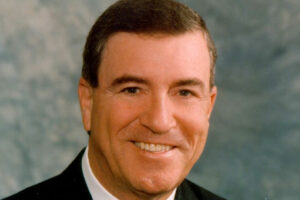
Interview of Michael (Mike) Johnston, February 26, 2015
Interviewed by Burdett Loomis
In a 2015 oral history interview, Mike Johnston recalls his time in the Kansas Senate from being a newly-elected Senator to his successful race for Minority Leader, unseating the incumbent Leader. Johnston talks about his interactions with other senators and the dynamics of the Senate in the mid-'80s. He discusses his relationship with the Governor's Office as he joined the administration of Joan Finney after deciding not to seek another term in the Senate. Johnston recalls the role of lobbyists in the legislative process and his perspective on that role when, after his retirement from the Turnpike Authority, Show Morehe represented the League of Kansas Municipalities for a short time. Show Less

Interview of Kenny Wilk, May 16, 2024
Interviewed by Chris Courtwright
Representative Kenny Wilk described himself as "curious" when he first arrived to the House--curious about how committees worked, who the people were. A Farm Bureau Citizenship Seminar had kindled his interest in politics. Rochelle Chronister, Assistant Majority Leader mentored him to meet everyone in both chambers. And he did! The interview is full of stories about the people with whom Wilk served, and what he learned from them. He moved from one area to another: budget policy, tax policy and economic development policy. He lost two leadership races, but that allowed him Show Moreto focus more intently on policy initiatives that came from committees he chaired: Kansas Bioscience Authority, the animal health corridor, NBAF, tax relief for military veterans, the Economic Growth Act, the tax exemption for machinery and equipment. Even after leaving the Kansas Legislature, he continued to serve. First, by chairing newly elected Governor Brownback's transition team, then by serving on the Kansas Board of Regents and the Kansas Bioscience Authority. His current job with the University of Kansas Health System keeps him involved with public policy issues, such as Medicaid Expansion. Show Less

Interview of Ed McKechnie, February 9, 2024
Interviewed by Chris Courtwright
This lengthy and wide-ranging interview is full of interesting stories about how the legislature worked when its leaders realized the House Democrats were in the majority by one vote (1990 election) with a new Democratic governor. The 1991-92 session was historic because of the major changes in property taxes and school finance. McKechnie built relationships across the aisle which helped him accomplish things and pass legislation. His interview is replete with descriptions of legislators with whom he worked. McKechnie served on the Kansas Bioscience Authority and after its demise, on the Kansas Board of Regents. Show More He discussed the transition of the University of Kansas Hospital to being designated a major cancer center. One particularly interesting story for football fans is about the major conference realignment that occurred from 2011 to 2012. He described in detail the negotiations over which university would stay or leave the Big XII. Ordinarily the Regents would not have been involved, but the impact of these decisions was too great to ignore. McKechnie also talks about the decisions the Regents made about raising tuition.
Highlights -- short excerpts from the interview
